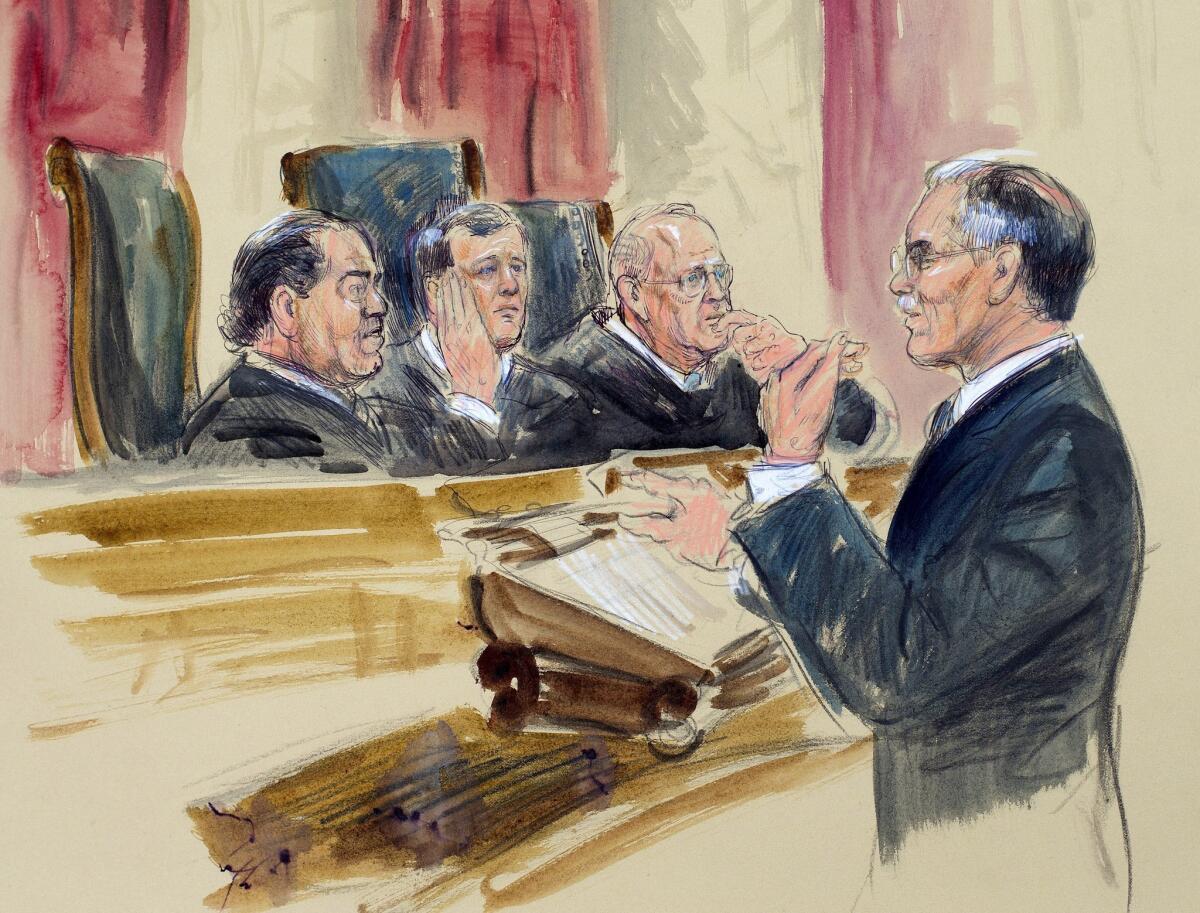Supreme Court meets to vote on Obamacare; Roberts likely holds key vote

- Share via
Reporting from Washington — When the Supreme Court justices met in private Friday to cast their votes and decide the reach of President Obama’s healthcare law, the outcome probably turned on the person who spoke first: Chief Justice John G. Roberts.
When the justices meet to decide cases, they vote in order of seniority, beginning with the chief justice. But even if the court’s customs did not set that order, it would have made sense in this case. With the court’s four liberal justices clearly ready to side with the administration, and three conservatives clearly lined up in opposition, Roberts, and perhaps Justice Anthony M. Kennedy, hold the deciding votes.
At stake is whether more than 7 million low- and moderate-income taxpayers can continue to receive subsidies that make their health insurance affordable.
Roberts uncharacteristically said little when the case was argued Wednesday. But the one substantive comment he did make has received intense scrutiny from lawyers and others trying to forecast whether the healthcare law will survive or be largely unraveled.
The comment involved a legal rule for how judges should resolve questions about big, ambiguous statutes.
Obama administration lawyers argue the Affordable Care Act, when read as a whole, shows that tax subsidies for health insurance are supposed to be available nationwide. The conservative groups challenging the law say its wording -- that subsidies will be provided through an “Exchange established by the State” -- mandate that the aid be allowed only in the handful of states that have opted to establish their own online healthcare marketplaces, rather than those that rely on the federal government’s healthcare.gov site.
When a three-judge panel of the federal 4th Circuit Court of Appeals in Virginia considered the case last year, they did not entirely agree with the administration.
“We cannot discern” just what Congress intended, said the panel, made up of Democratic appointees. But since the wording of the law was “ambiguous,” they said, the legal rule was to favor the interpretation made by the agency that administers it, in this case the Internal Revenue Service.
The rule that the interpretation by federal regulators wins in court if a law is unclear was set by the Supreme Court in 1984. It is known as the “Chevron doctrine” because it was set down in a case involving the giant oil company. The doctrine requires judges to be “highly deferential” to an agency’s interpretations of statutes, the appeals court explained.
Roberts is no fan of the Chevron rule. Two years ago, in a dissent he wrote in a case involving the Federal Communication Commission, he said he had a “fundamental” disagreement with giving regulators the benefit of the doubt in all cases.
The “vast and varied federal bureaucracy” churns out “reams of regulations [that] touch almost every aspect of daily life,” he said. “And more are on the way,” he added, pointing at the Affordable Care Act.
Roberts said the justices should not simply defer to regulators. Their rules “warrant deference only if Congress has delegated authority to definitively interpret a particular ambiguity in a particular manner,” he wrote in the 2013 case, City of Arlington vs. FCC. Justices Kennedy and Samuel Alito said they agreed with Roberts.
The chief justice’s doubts about the Chevron rule explain why Solicitor Gen. Donald Verrilli, arguing for the administration, insisted that the Affordable Care Act isn’t ambiguous at all. In his interpretation, the law as written was entirely clear and left no doubt that all qualified taxpayers were entitled to a subsidy.
But late in Wednesday’s argument, both Roberts and Kennedy raised the Chevron issue of deferring to regulators.
Kennedy’s comment was ominous for the government’s case. The law would have to be “very, very clear” to uphold the IRS rule, he said. “It seems to me a drastic step for us to say the IRS and its director can make this call” which involves having the Treasury spend billions of dollars in tax credits, Kennedy said.
When Roberts spoke, near the end of the argument, his words were more cryptic.
“If you’re right about Chevron, that would indicate that subsequent administration could change that interpretation?” he asked the solicitor general.
Some saw his comment as welcome for the administration and for the principle that the voters get the last word. If the court defers to the administration and upholds the 4th Circuit’s decision in this case, he may have been suggesting, a future electorate could choose a Republican president in 2016 who could limit the tax subsidies. If that’s what he meant, Roberts might have been indicating a willingness to keep the law intact and let the political process play out.
But Roberts’ comments could also be read to say the meaning of a law should not turn on who controls the bureaucracy. That point would echo his 2013 dissent in the FCC case, in which he quoted Chief Justice John Marshall’s declaration that “It is emphatically the province and the duty of the judicial department to say what the law is.”
For now, no one knows except within the court. Friday’s vote decided which side has the majority. In a few weeks, whoever is writing the majority opinion -- probably Roberts -- will circulate a draft among the justices. Then the dissenters will go to work on an argument that they hope will persuade someone in the majority to change his or her mind.
The court is not likely to issue its decision and dissent in King vs. Burwell before the last week in June.
For more on the Supreme Court, follow @DavidGSavage on Twitter.
More to Read
Sign up for Essential California
The most important California stories and recommendations in your inbox every morning.
You may occasionally receive promotional content from the Los Angeles Times.











